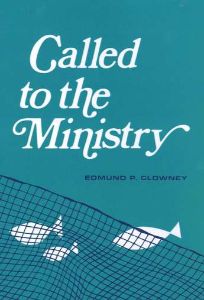Book Review: Called to the Ministry
<- Back
Called to the Ministry
Book Author: Edmund P clowney
Review Author: Ann
Byford Free Reformed Church
Pro Ecclesia Bookshop
Called to the Ministry by Edmund P Clowney
1964/90 pages
Edmund Clowney was born in Philadelphia in 1917. After working several years as a pastor he became the first president of Westminster Theological Seminary where he remained until 1984. Clowney was one of the Associate editors involved in the production of the New Geneva Study Bible published in 1995. He wrote several books, amongst others this little book of 90 pages entitled, ‘Called to the Ministry’.
For those young men in our churches who are interested in entering the ministry, this is a very helpful little book. It’s not only for the young men; Clowney shows how all church members are called to be involved in selecting, encouraging and sending suitable candidates to study for the ministry.
Clowney addresses the question of how the Lord calls young men to the ministry. How does an applicant know that the Lord is calling him? Although today there is no direct intervention from heaven, like what happened to Elisha or like the disciples when Jesus lived on earth, the answer to this question must come from the Lord Himself. And it must be found in His Word.
All Christians have a calling from God. God has called all His own by name, and at the same time, we all carry God’s Name on our foreheads. We all have a calling to respond to. But not all are called to the particular task of the ministry of the gospel. Any person who would consider the ministry first needs to search himself to see if he is responding to the call which goes out to all Christians. He may not be neutral to that first calling.
This first calling is a call to service which requires from us, a response to God’s royal bidding. It involves serving and suffering. It involves denying ourselves; not seeking worldly goods and honour but seeking first the kingdom of God. Each Christian must explore the gifts God has given him and put them to use. In using and exercising the gifts, it will become more and more clear to the person himself, but also to those around him, where and how God would have that person serve Him.
Those young men who are keen to serve and respond to the call from God’s throne should consider the distinctive aspects of the particular call to the ministry. Ministry is a life of service with great responsibility. To function well, a minister requires a particular endowment of gifts, and Clowney draws from Scripture to elaborate on the gifts needed for the task. Although the applicant may feel overwhelmed by the enormity of the requirements and a sense of his own unworthiness, he may be encouraged that God gives richer graces to His servant, who is faithful. A genuine applicant may learn through many ways what ministry God requires of him.
Then it may perhaps become apparent that the ministry of the gospel is not the place where he is called. In humble submission to God’s guidance he may see another field of work opened to him, perhaps in teaching or leadership in the church.
Finally, Clowney deals with the involvement of the church, in recognising, acknowledging, and encouraging a potential young man as he grows and lives out of the gifts given to him in a growing awareness of the call to the ministry. What a timely reminder is offered in this book, encouraging churches to take seriously the call to provide workers for the spread of the gospel.
Ann Amoraal, Byford

